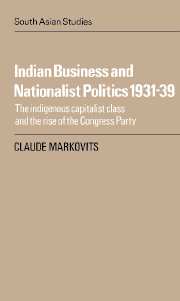 Indian Business and Nationalist Politics 1931–39
Indian Business and Nationalist Politics 1931–39 Book contents
- Frontmatter
- Contents
- Preface
- Abbreviations
- Introduction
- 1 Indian capital
- 2 Crisis and opportunities
- 3 Business, Civil Disobedience and the reforms 1931–1935
- 4 The turning point: capitalists and Congressmen 1935–1937
- 5 Business, the central government and the Congress 1937–1939
- 6 Indian business and the Congress provincial governments 1937–1939
- Conclusion
- APPENDICES
- Biographical notes
- Bibliography
- Glossary
- Index
6 - Indian business and the Congress provincial governments 1937–1939
Published online by Cambridge University Press: 25 October 2009
- Frontmatter
- Contents
- Preface
- Abbreviations
- Introduction
- 1 Indian capital
- 2 Crisis and opportunities
- 3 Business, Civil Disobedience and the reforms 1931–1935
- 4 The turning point: capitalists and Congressmen 1935–1937
- 5 Business, the central government and the Congress 1937–1939
- 6 Indian business and the Congress provincial governments 1937–1939
- Conclusion
- APPENDICES
- Biographical notes
- Bibliography
- Glossary
- Index
Summary
The accession to office of the Congress in seven provinces in July 1937 changed the pattern of its relationship with big business. The business class became one of the interest groups competing for the favours of the new ministries. It was the most powerful of all and seemed to be in the position of getting rewarded for the services it had rendered to the Congress during the years of struggle. But the Congress possibilities of rewarding past services were severely limited by financial constraints, as central finances remained solidly in British hands and provinces had largely inelastic sources of revenue. There were also political constraints, the growing populist pressures which forced the party to take into account, if not the interests of the broad masses, at least those of specific categories such as the working class or sections of the peasantry. Social unrest was on the increase in mid-1937 in the countryside as well as in the towns and cities. This created anxieties in business circles about the future course of policy of the Congress ministries, which explain that the joy manifested by Birla when he heard that Congress had accepted office was not shared by all businessmen. Birla and his Marwari friends had the bulk of their interests in Bengal and in the Indian States. They would not be directly affected by the policies of the Congress ministries and could afford to take a long-term view of the developments. Those capitalists (and they were the majority) who had their interests in the Congress-ruled provinces were more interested in the concrete measures the Congress ministries would take and the possible impact on their business.
- Type
- Chapter
- Information
- Indian Business and Nationalist Politics 1931–39The Indigenous Capitalist Class and the Rise of the Congress Party, pp. 150 - 178Publisher: Cambridge University PressPrint publication year: 1985
- 1
- Cited by


